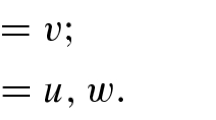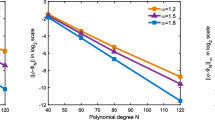Abstract
In this paper, we study and analyze the time fractional Ginzburg–Landau equation (FGLE) using finite element methods (FEMs) in space and L1 scheme in time. The unconditional optimal \(L^2\)-norm error estimates are obtained based on the time-space error splitting technique. Using the relation between interpolation operator and Ritz projection operator, we obtain the superclose results in \(H^1\)-norm. Furthermore, the global superconvergence results are established through the interpolation postprocessing technique. To overcome the weak singularity of the solution at the initial time and improve the computational efficiency, we adopt the nonuniform L1 scheme in the time direction and built corresponding fast algorithm based on sum-of-exponential technique. Finally, we provide several numerical experiments to verify the theoretical results and demonstrate the advantages of the fast algorithm.









Similar content being viewed by others
Data Statement
Data sharing not applicable to this article as no datasets were generated or analyzed during the current study.
References
Alikhanov AA (2015) A new difference scheme for the time fractional diffusion equation. J Comput Phys 280:424–438
Aranson IS, Kramer L (2002) The world of the complex Ginzburg–Landau equation. Rev Mod Phys 74(1):99
Cao J, Xu C (2013) A high order scheme for the numerical solution of the fractional ordinary differential equations. J Comput Phys 238:154–168
Cao W, Zhang Z, Karniadakis GE (2015) Time-splitting schemes for fractional differential equations I: smooth solutions. SIAM J Sci Comput 37(4):A1752–A1776
Du Q, Gunzburger MD, Peterson JS (1992) Analysis and approximation of the Ginzburg–Landau model of superconductivity. SIAM Rev 34(1):54–81
Duan J, Titi E, Holmes P (1993) Regularity, approximation and asymptotic dynamics for a generalized Ginzburg–Landau equation. Nonlinearity 6(6):915–933
Gao H (2014) Optimal error analysis of Galerkin FEMs for nonlinear Joule heating equations. J Sci Comput 58(3):627–647
Gao G, Sun Z, Zhang H (2014) A new fractional numerical differentiation formula to approximate the Caputo fractional derivative and its applications. J Comput Phys 259:33–50
Guan Z, Wang J, Nie Y (2021) Unconditionally optimal error estimates of two linearized Galerkin FEMs for the two-dimensional nonlinear fractional Rayleigh–Stokes problem. Comput Math Appl 93:78–93
Guan Z, Wang J, Liu Y, Nie Y (2022) Unconditionally optimal convergence of a linearized Galerkin FEM for the nonlinear time-fractional mobile/immobile transport equation. Appl Numer Math 172:133–156
Hao Z, Sun Z (2016) A linearized high-order difference scheme for the fractional Ginzburg–Landau equation. Numer Methods Partial Differ. Equ. 33(1):105–124
He D, Pan K (2018) An unconditionally stable linearized difference scheme for the fractional Ginzburg–Landau equation. Numer Algorithms 79:899–925
Heydari M, Hosseininia M, Atangana A, Avazzadeh Z (2020) A meshless approach for solving nonlinear variable-order time fractional 2D Ginzburg–Landau equation. Eng Anal Bound Elem 120:166–179
Huo Z, Jia Y (2009) Global well-posedness for the generalized 2D Ginzburg–Landau equation. J Differ Equ 247(1):260–276
Jiang S, Zhang J, Zhang Q, Zhang Z (2017) Fast evaluation of the Caputo fractional derivative and its applications to fractional diffusion equations. Commun Comput Phys 21(3):650–678
Langlands T, Henry BI (2005) The accuracy and stability of an implicit solution method for the fractional diffusion equation. J Comput Phys 205(2):719–736
Li M (2022) Cut-off error splitting technique for conservative nonconforming VEM for N-coupled nonlinear Schrödinger–Boussinesq equations. J Sci Comput 93(3):1–44
Li B, Sun W (2012) Error analysis of linearized semi-implicit Galerkin finite element methods for nonlinear parabolic equations. Int J Numer Anal Model 10(3):622–633
Li B, Sun W (2013) Unconditional convergence and optimal error estimates of a Galerkin-mixed FEM for incompressible miscible flow in porous media. SIAM J Numer Anal 51(4):1959–1977
Li D, Wang J (2017) Unconditionally optimal error analysis of Crank–Nicolson Galerkin FEMs for a strongly nonlinear parabolic system. J Sci Comput 72(2):892–915
Li M, Zhao Y (2018) A fast energy conserving finite element method for the nonlinear fractional Schrödinger equation with wave operator. Appl Math Comput 338:758–773
Li D, Liao H, Sun W, Wang J, Zhang J (2018) Analysis of L1-Galerkin FEMs for time-fractional nonlinear parabolic problems. Commun Comput Phys, 24(1):86–103
Li M, Huang C, Wang N (2017a) Galerkin finite element method for the nonlinear fractional Ginzburg–Landau equation. Appl Numer Math 118:131–149
Li D, Wang J, Zhang J (2017b) Unconditionally convergent L1-Galerkin FEMs for nonlinear time-fractional Schrödinger equations. SIAM J Sci Comput 39(6):A3067–A3088
Li D, Zhang J, Zhang Z (2018) Unconditionally optimal error estimates of a linearized Galerkin method for nonlinear time fractional reaction–subdiffusion equations. J Sci Comput 76(2):848–866
Li M, Shi D, Wang J (2020) Unconditional superconvergence analysis of a linearized Crank–Nicolson Galerkin FEM for generalized Ginzburg–Landau equation. Comput Math Appl 79(8):2411–2425
Liao H, Li D, Zhang J (2018a) Sharp error estimate of the nonuniform L1 formula for linear reaction–subdiffusion equations. SIAM J Numer Anal 56(2):1112–1133
Liao H, McLean W, Zhang J (2019a) A discrete Grönwall inequality with applications to numerical schemes for subdiffusion problems. SIAM J Numer Anal 57(1):218–237
Liao H, Yan Y, Zhang J (2019b) Unconditional convergence of a two-level linearized fast algorithm for nonlinear subdiffusion equations. J Sci Comput 80(1):1–25
Lin Y, Xu C (2007) Finite difference/spectral approximations for the time-fractional diffusion equation. J Comput Phys 225(2):1533–1552
Milovanov AV, Rasmussen JJ (2005) Fractional generalization of the Ginzburg–Landau equation: an unconventional approach to critical phenomena in complex media. Phys Lett A 337(1):75–80
Mustapha K (2015) Time-stepping discontinuous Galerkin methods for fractional diffusion problems. Numer Math 130(3):497–516
Mustapha K, AlMutawa J (2012) A finite difference method for an anomalous sub-diffusion equation, theory and applications. Numer Algorithms 61(4):525–543
Mvogo A, Tambue A, Ben-Bolie GH, Kofané TC (2016) Localized numerical impulse solutions in diffuse neural networks modeled by the complex fractional Ginzburg–Landau equation. Commun Nonlinear Sci Numer Simul 39:396–410
Pu X, Guo B (2011) Well-posedness and dynamics for the fractional Ginzburg–Landau equation. Appl Anal 92(2):318–334
Raza N (2018) Exact periodic and explicit solutions of the conformable time fractional Ginzburg-Landau equation. Opt Quantum Electron 50(3):154
Shi D, Wang J (2017) Unconditional superconvergence analysis of a Crank–Nicolson Galerkin FEM for nonlinear Schrödinger equation. J Sci Comput 72(3):1093–1118
Shi D, Wang F, Fan M, Zhao Y (2015) A new approach of the lowest order anisotropic mixed finite element high accuracy analysis for nonlinear sine-Gordon equations. Math Numer Sin 37(2):148
Shi D, Yan F, Wang J (2016) Unconditional superconvergence analysis of a new mixed finite element method for nonlinear Sobolev equation. Appl Math Comput 274:182–194
Skarka V, Aleksić N (2006) Stability criterion for dissipative soliton solutions of the one-, two-, and three-dimensional complex cubic–quintic Ginzburg–Landau equations. Phys Rev Lett 96(1):013903
Sun Z, Wu X (2006) A fully discrete difference scheme for a diffusion-wave system. Appl Numer Math 56(2):193–209
Tarasov VE (2006) Psi-series solution of fractional Ginzburg–Landau equation. Math Gen 39(26):8395–8407
Tarasov VE, Zaslavsky GM (2005) Fractional Ginzburg–Landau equation for fractal media. Phys A: Stat Mech Appl 354:249–261
Thomée V (2007) Galerkin finite element methods for parabolic problems. Springer Science & Business Media, Berlin
Wang J (2014) A new error analysis of Crank–Nicolson Galerkin FEMs for a generalized nonlinear Schrödinger equation. J Sci Comput 60(2):390–407
Wang P (2021) Fast exponential time differencing/spectral-Galerkin method for the nonlinear fractional Ginzburg–Landau equation with fractional Laplacian in unbounded domain. Appl Math Lett 112:106710
Wang F, Zhao Y, Chen C, Wei Y, Tang Y (2019) A novel high-order approximate scheme for two-dimensional time-fractional diffusion equations with variable coefficient. Comput Math Appl 78(5):1288–1301
Weitzner H, Zaslavsky GM (2003) Some applications of fractional equations. Commun Nonlinear Sci Numer Simul 8(3):273–281
Yan Y, Sun Z, Zhang J (2017) Fast evaluation of the Caputo fractional derivative and its applications to fractional diffusion equations: a second order scheme. Commun Comput Phys 22(4):1028–1048
Zhang M, Zhang G (2021) Fast iterative solvers for the two-dimensional spatial fractional Ginzburg–Landau equations. Appl Math Lett 121:107350
Zhang Y, Sun Z, Liao H (2014) Finite difference methods for the time fractional diffusion equation on non-uniform meshes. J Comput Phys 265:195–210
Zhang Q, Li Y, Su M (2019a) The local and global existence of solutions for a time fractional complex Ginzburg–Landau equation. J Math Anal Appl 469(1):16–43
Zhang Z, Li M, Wang Z (2019b) A linearized Crank–Nicolson Galerkin FEMs for the nonlinear fractional Ginzburg–Landau equation. Appl Anal 98(15):2648–2667
Zhang L, Zhang Q, Sun H (2020) Exponential Runge–Kutta method for two-dimensional nonlinear fractional complex Ginzburg–Landau equations. J Sci Comput 83:59
Zhang Q, Zhang L, Sun H (2021) A three-level finite difference method with preconditioning technique for two-dimensional nonlinear fractional complex Ginzburg–Landau equations. J Comput Appl Math 389:113355
Zhao X, Sun Z, Hao Z (2014) A fourth-order compact ADI scheme for two-dimensional nonlinear space fractional Schrödinger equation. SIAM J Sci Comput 36(6):A2865–A2886
Zhuang P, Liu F, Anh V, Turner I (2009) Stability and convergence of an implicit numerical method for the non-linear fractional reaction–subdiffusion process. IMA J Appl Math 74(5):645–667
Acknowledgements
The work is supported by the China Postdoctoral Science Foundation (2023T160589), National Natural Science Foundation of China (nos. 11801527, 11971416), Natural Science Foundation of Henan Province (222300420256), Training Plan of Young Backbone Teachers in Colleges of Henan Province (no. 2020GGJS230), Henan University Science and Technology Innovation Talent support program (19HASTIT025).
Author information
Authors and Affiliations
Corresponding authors
Ethics declarations
Conflict of interest
The authors declare that we have no conflict of interest.
Additional information
Communicated by Agnieszka Malinowska.
Publisher's Note
Springer Nature remains neutral with regard to jurisdictional claims in published maps and institutional affiliations.
Rights and permissions
Springer Nature or its licensor (e.g. a society or other partner) holds exclusive rights to this article under a publishing agreement with the author(s) or other rightsholder(s); author self-archiving of the accepted manuscript version of this article is solely governed by the terms of such publishing agreement and applicable law.
About this article
Cite this article
Chen, F., Li, M., Zhao, Y. et al. Convergence and superconvergence analysis of finite element methods for nonlinear Ginzburg–Landau equation with Caputo derivative. Comp. Appl. Math. 42, 271 (2023). https://doi.org/10.1007/s40314-023-02409-4
Received:
Revised:
Accepted:
Published:
DOI: https://doi.org/10.1007/s40314-023-02409-4
Keywords
- Nonlinear time FGLE
- Convergence and superconvergence
- FEM
- Time-space error splitting technique
- Fast algorithm




